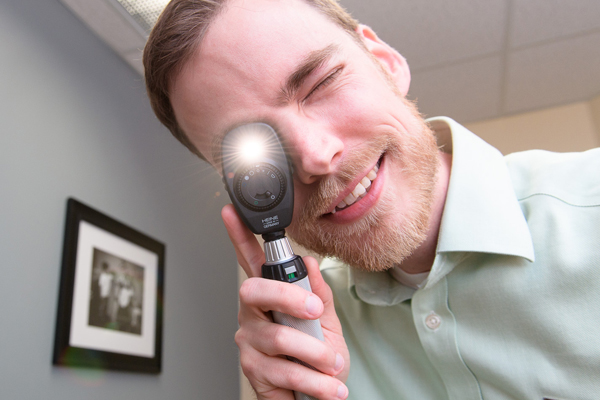Good eye health isn’t just about seeing well and checking that your glasses or contact lens are the correct prescription. Regular eye examinations play a crucial role in the early detection of conditions such as glaucoma, diabetes, and high blood pressure, often before other symptoms appear.
The College of Optometrists is encouraging all adults to make sure they attend their regular eye examination. This is usually every two years but may be more regularly if recommended by their optometrist.
Dr Paramdeep Bilkhu MCOptom, Clinical Adviser to The College of Optometrists, said: “With eye conditions like macular degeneration and symptoms such as screen related eyestrain and blurred vision increasing in the UK in recent years, there’s no better time to commit to taking care of your eyes. By booking your next regular eye examination, practising healthy screen habits, or making sure to remember to wear your glasses when you need them, you can help ensure you have clearer, healthier eyesight for many years to come.
“If you notice any changes in your sight or experience any problems with your eyes, contact your optometrist in the first instance as soon as possible rather than waiting for your next scheduled eye examination. They will be able to provide management advice and may recommend an eye examination to suit your needs.”

Eating a wide variety of fruit and vegetables, particularly leafy green veg like kale and spinach, may support good eye health and reduce your risk of macular degeneration. Following a healthy diet will also help you to maintain a healthy weight and keep your blood pressure under control, reducing your risk of conditions such as diabetes and risk of stroke, which can both affect your vision.
Ultraviolet (UV) light from the sun can contribute to eye conditions such as cataracts and potentially age-related macular degeneration (AMD). Wear high-quality, dark sunglasses that provide UV protection and have the UKCA or CE mark. Don’t forget to wear them during winter too – low winter sun can cause glare and be just as harmful as summer rays.
If you spend a lot of time on digital devices, you might experience eye strain, dryness, or blurred vision. The simple 20-20-20 rule can help: every 20 minutes, look at something 20 feet away for at least 20 seconds. This short break relaxes your eye muscles and reduces strain.
Eye exams do more than just check your vision; they are a window to your overall health. They can uncover early signs of serious health issues, even if you feel perfectly fine. Make it a priority to schedule and attend regular eye exams this year.